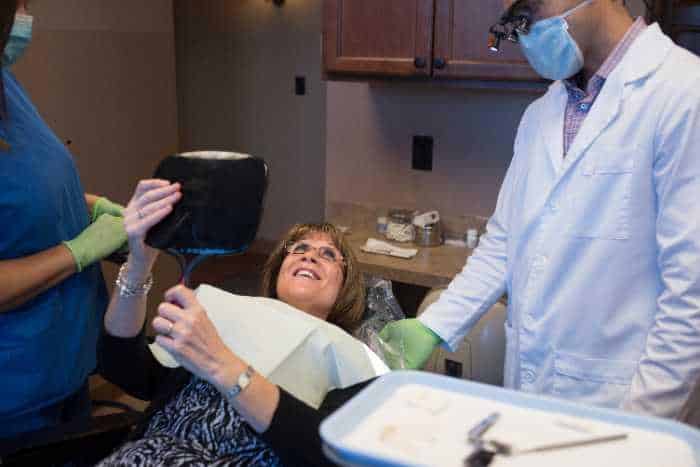
Going to the dentist might make you feel anxious. But what if we told you that some of the procedures associated with regular visits to a dental professional could help to prevent a common and serious dental problem known as gingivitis? Keep reading to learn the causes, what to look for, and how to cure it!
What is Gingivitis (gum Immflamation)?
Gingivitis is an early form of more serious gum disease or periodontal disease that occurs when the gums become inflamed. This inflammation can cause bleeding and swollen gums, as well as halitosis. It is a form of gum disease but is also a very common problem, and luckily, if you catch it early, it can be cured easily.What causes gingivitis?
There are many different causes of gingivitis, but the leading cause is excessive plaque and tartar on your teeth and gum line. Plaque is a sticky film that forms on your teeth and gums. If plaque and tartar are not removed from your teeth, it can cause inflammation and infection in the gums. You’d probably be shocked to hear that gum disease is not always caused by poor dental health. Other risk factors of gingivitis include:- Poor Oral Hygiene: If you do not remove plaque from your teeth regularly, it can cause inflammation and infection in the gums.
- Smoking: Smoking can damage the soft tissues in your mouth, making them more susceptible to infection and inflammation.
- Diabetes and Poor Nutrition: People with diabetes are at a higher risk of developing gum disease because diabetes can weaken the immune system and make it harder for the body to fight off infection.
- Hormonal Changes: Hormonal changes, such as during pregnancy, can cause inflammation of the gums. This is because the hormones in your body can affect how well your gums heal and fight infection.
- Medication: Some common medications that can lead to gingivitis include oral contraceptives, antidepressants, and blood pressure medication.
- Genetics: Some people are more prone to periodontal diseases due to their family history. If inflammation of the gums occurs in your parents or grandparents, you may be more likely to develop the condition as well.
The Symptoms of Gingivitis
Symptoms of gum inflammation can vary from person to person, but some common symptoms include:- Bad breath
- Red and inflamed gums
- Sore and bleeding gums
- Pain when chewing or brushing teeth
How is gum disease diagnosed?
If you are experiencing any of the above symptoms, your dentist will likely perform a dental exam to diagnose the problem. During the exam, your dentist will check for gum inflammation and gums that bleed easily. They may also take x-rays of your teeth to look for signs of plaque buildup or infection. Your dentist may recommend that you see your general practitioner for a medical evaluation to check for underlying health conditions if it’s not clear what has caused your gingivitis. In some cases, this will be done instead of immediately treating the disease with medication or surgery. Your dentist may also recommend that you see a specialist in gum diseases (a Periodontist) to get evaluated for underlying or undiagnosed health conditions.How to Prevent Inflammation of the Gums and Periodontal Disease
If you are at high risk for developing gingivitis, there are several things you can do to prevent it. Some tips to prevent gum disease include:- brushing your teeth at least twice a day with fluoride toothpaste
- flossing daily
- regular dental checkups and cleanings
- avoiding smoking and tobacco products
- eating a healthy diet
- managing diabetes if you have it
How to Treat Gingivitis
If your dentist has diagnosed you with gum disease, they will likely recommend a course of treatment. Treatment options can include:- rinsing with saltwater
- mouthwash and antibacterial rinses
- good oral hygiene
- antibiotics (if an infection is present)
- scaling and root planing (deep cleaning of the teeth and gums)
- surgery (if the gums are severely damaged)
Saltwater Rinsing
Saltwater rinsing is a common treatment for gingivitis. It involves rinsing your mouth with salt water to help reduce inflammation and bacteria.Antiseptic Mouthwash
Mouthwash and rinses can also be used to help treat gum disease. Choose one that contains fluoride to help reduce plaque and bacteria.Good Oral Hygiene
The simplest way to treat gum infection is by brushing and flossing your teeth regularly. This will help remove plaque and bacterial growth from your teeth and gums.Antibiotics
If a bacterial infection is present, your dentist may prescribe antibiotics to fight the infection. Over-the-counter medications will help with temporary pain relief, but they will not get rid of an infection.Scaling and Root Planing
If the gums are severely damaged, your dentist may recommend that you schedule a dental appointment for deep cleaning of the teeth and gums. In this procedure, the dentist will remove tartar and plaque from below the gum line using special tools.Surgery
In some cases, you may need surgery to treat gingivitis. Surgery can involve removing the infected gum tissue or reshaping the gums. If you are at risk of developing gingivitis, it is important to follow your dentist’s recommendations to prevent the disease. Early diagnosis and treatment is the best way to cure gum disease. If you are experiencing any of the symptoms of gingivitis, make an appointment to see a dentist as soon as possible.The Long-Term Effects of Untreated Gingivitis
Untreated gingivitis can lead to serious problems such as periodontitis, putting your oral health at risk. Periodontitis is a serious infection of the gums and bones that support the teeth. If left untreated, it can lead to tooth loss. Preventing gingivitis is simple and easy! Just follow these tips and see your dentist for regular checkups and cleanings. Early diagnosis and treatment is the best way to cure gingivitis.Contact Eberhardt Dentistry!
Now that you know what causes gingivitis, if you believe you may be suffering from this form of gum disease, make sure to contact your dentist. They can diagnose and treat any underlying issues with antibiotics or other medications, as well as give you advice on how to care for your teeth at home. If gingivitis has prevented you from living a normal life, let us help you get rid of it once and for all. You deserve a healthy and happy mouth!About The Author
Dr. Kyle Eberhardt enjoys helping patients achieve better overall health through enhanced dental care. He earned his Doctor of Dental Surgery degree in 2007 and has since pursued continuing education in the field of dentistry. He is committed to lifelong learning and has received a fellowship from the Midwest Implant Institute in Ohio. He has also pursued advanced training with CEREC doctors in Arizona and North Carolina.



